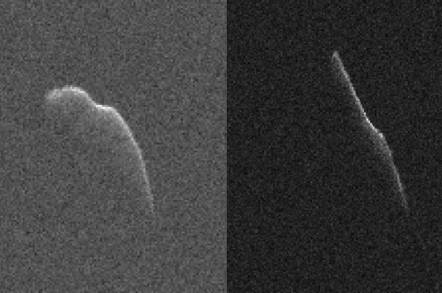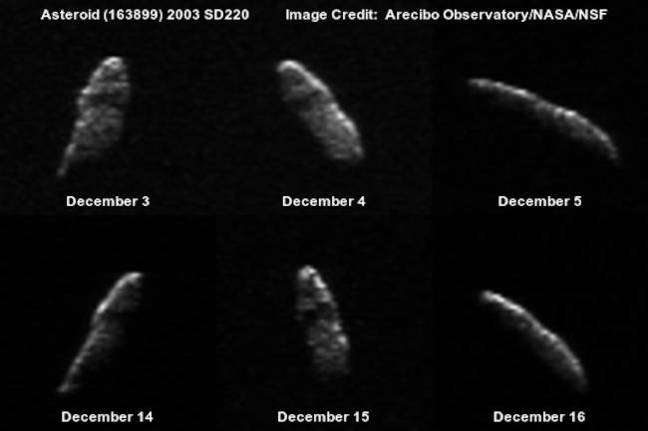Hey, Santa – duck! Space shaft buzzes Earth on Christmas Eve
Who ordered an asteroid?

Pics Unfortunate-looking Asteroid 2003 SD220 will shoot past Earth on Christmas Eve, say scientists tracking the mysterious speeding rock.
The cosmic boulder is described as "highly elongated," and at least 3,600 feet (1,100 metres) in length. It was picked up this week by a 230-foot (70-metre) NASA antenna in Goldstone, California, while a mere 7.3 million miles (12 million kilometres) from our planet.
Classified as a near-Earth object (NEO), Asteroid SD220 will pass our world with just 6.8 million miles (11 million kilometres) to spare. Boffins insist there is no need to panic.
"There is no cause for concern over the upcoming flyby of asteroid 2003 SD220 this Christmas Eve," said Paul Chodas, NASA's Center for NEO Studies boss.
"The closest this object will come to Santa and his eight tiny reindeer is about 28 times the distance between Earth and the Moon."
Spoilsports. So no, you can't claim you neglected to buy a turkey for Christmas dinner because you thought the world would end. And yes, you will have to watch the Queen's Christmas Message after all, Brits.

Asteroid 2003 SD220 is due to visit Earth again in 2018 – at a safe distance of 1.8 million miles (2.8 million kilometres) – and then return in 2070 to find out if we haven't annihilated ourselves as a civilization, again missing us by 1.7 million miles (2.7 million kilometres). As its name suggests, the asteroid was discovered 12 years ago, so we've known about it for a while.
Crazy people feared the rock would trigger earthquakes, volcanos, dogs and cats living together, but they are wrong. Very wrong. Merry Christmas. ®








 User Center
User Center My Training Class
My Training Class Feedback
Feedback











